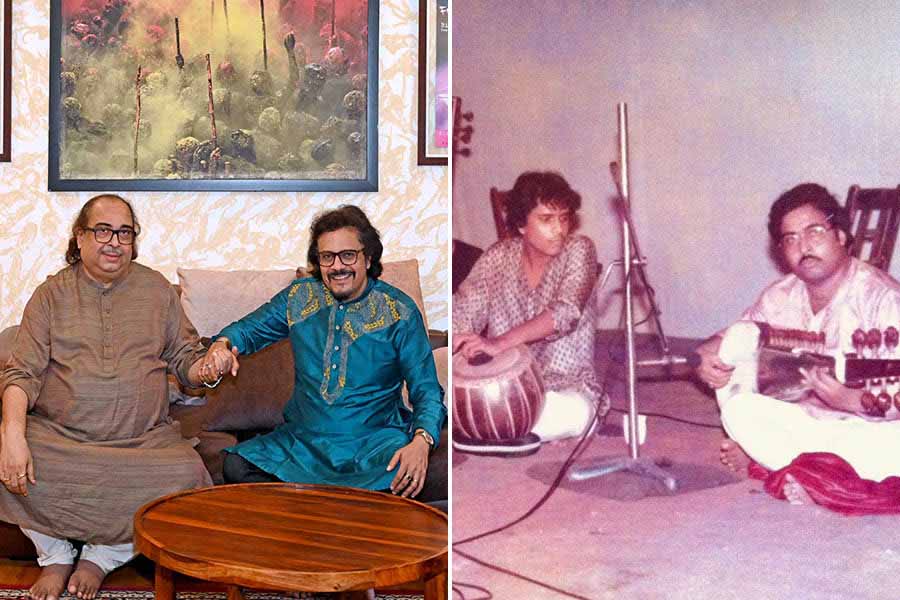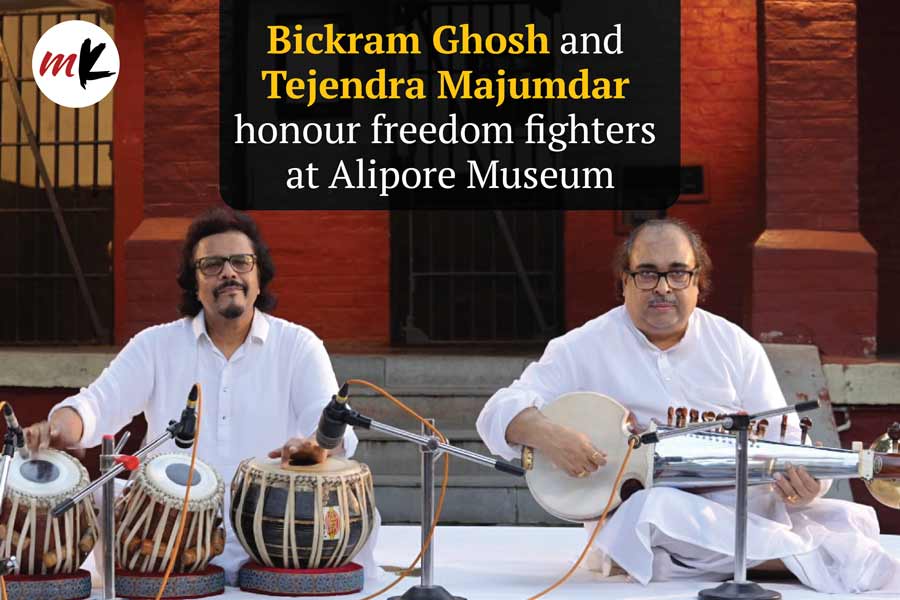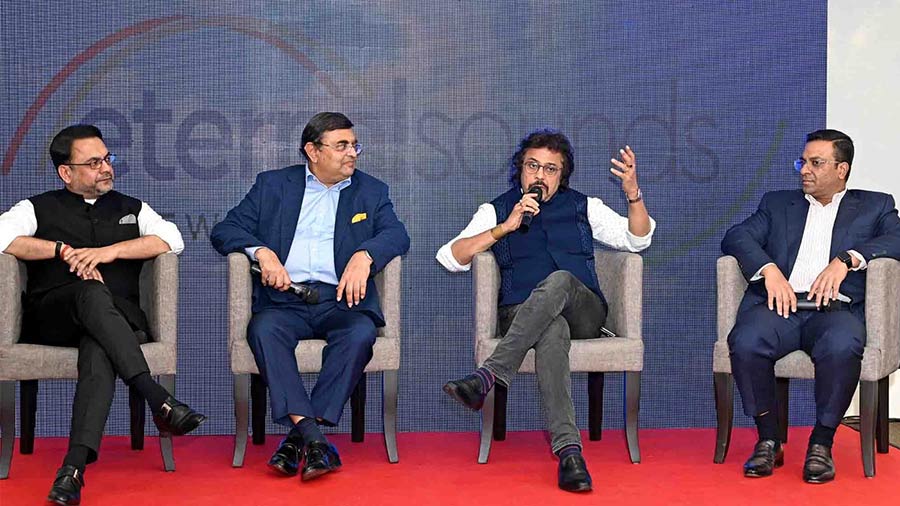To celebrate 40 years of friendship, percussionist Bickram Ghosh and sarod master Tejendra Narayan Majumdar will hold a special three-hour performance at G D Birla Sabhagar on Sunday, August 18 (tickets here). My Kolkata spoke to the childhood buddies about their bond, riyaaz and raga in the age of reels, and more.
My Kolkata: Tell us about your friendship. How did it all start?
Bickram Ghosh (BG): Our first concert was in 1984. The companionship goes a long way back to when we had started to do our riyaaz together. When Tejendra (Narayan Majumdar) used to stay in Ganguly Bagan, I used to reach his place by changing two buses and then taking an auto while carrying two tablas in hand. Needless to say, my co-passengers in the autos used to be exasperated with me sitting with the tablas! When I used to reach his home, say around 7.30 in the morning, his mother used to ask: ‘Ki re? Tui?’ (What’s up? This early?) I used to respond: ‘Aaj saradin hobe. Dekhun na jodi ektu mangsho kora jay?’ (We will practise the entire day. How about some mutton later?) We used to play for hours and hours. Sometimes he used to come to our home. My father (Shankar Ghosh) sometimes joined us. After he shifted to Garia, I used to go there, too. Chemistry between two artistes or performers does not develop just like that; the more you get to know each other, the better you get along. We have been hanging out together for decades.
Tejendra Narayan Majumdar (TNM): My first Dover Lane Conference was in 1991. I was blessed to have Bickram’s father, Shankar Ghosh, beside me. He was with me at many of my performances. Among them, one of the most memorable was the Park Circus music conference. Shankar Ghosh, who also used to play with my guru, Ustad Ali Akbar Khan, gave me so many valuable tips. I used to go to his house often and connected with Bickram there.
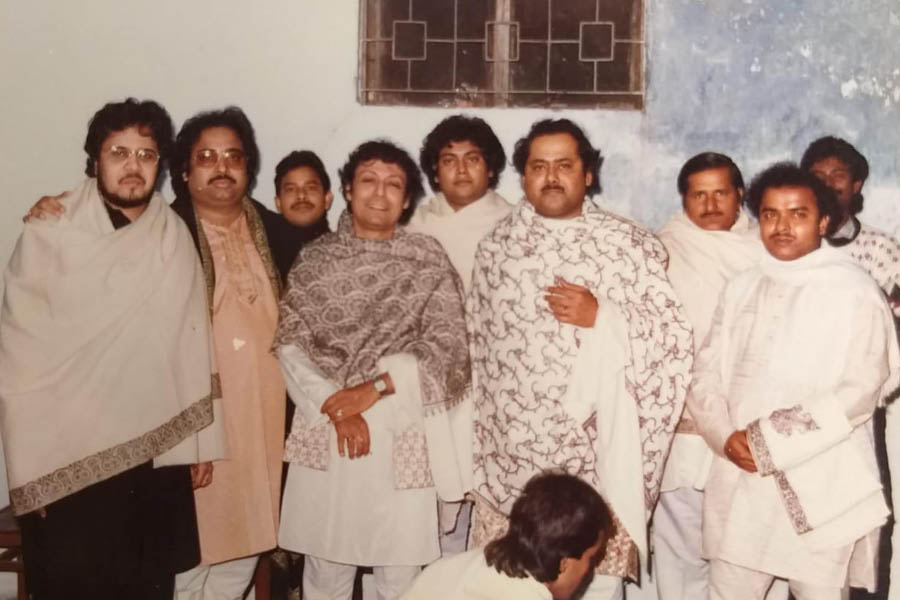
An old photograph of (extreme left) Bickram Ghosh and Tejendra Majumdar with others Courtesy Bickram Ghosh
BG: Our previous generation had such stalwarts that we always felt intimidated. We never thought that we would reach the position that we are in today by God’s grace. We kept trying. It was our time for real struggle. Once, around 1985-86, we were performing at Garia. We were the penultimate performers. It was dawn when we got up on the open-air stage. There were only five people in the audience — three from his family, two from mine. We still performed for one and a half hours. This is how we started. And now we get to hear lovely things from people and play in packed auditoriums. Our predecessors were such big stars that we just wanted to create some space for ourselves amid them. Both of us still believe in that simplicity and a headspace of gratitude. We did not bother about what we would achieve but focussed on how to enhance our skills.
Tell us about your understanding on stage.
BG: When we play together, he starts with the alaap of a raga. There’s no tabla in it. My portion starts with gat (melodic composition).Though I don’t play in the alaap portion, my construct starts from there. If I don’t do that, if I don’t follow him, I won’t be able to start playing at the right point, because he is laying the ground for the music to unfold. For barhat (progression), continuity is critical. This is where the actual chemistry is created, this is where it is clear whether two artistes are playing in tandem. The little nuances perform an important role in the whole presentation. The audience may or may not be aware of it, but what is important is that when they go back home, the experience of a performance should elevate them. We both think that this is most important in society.
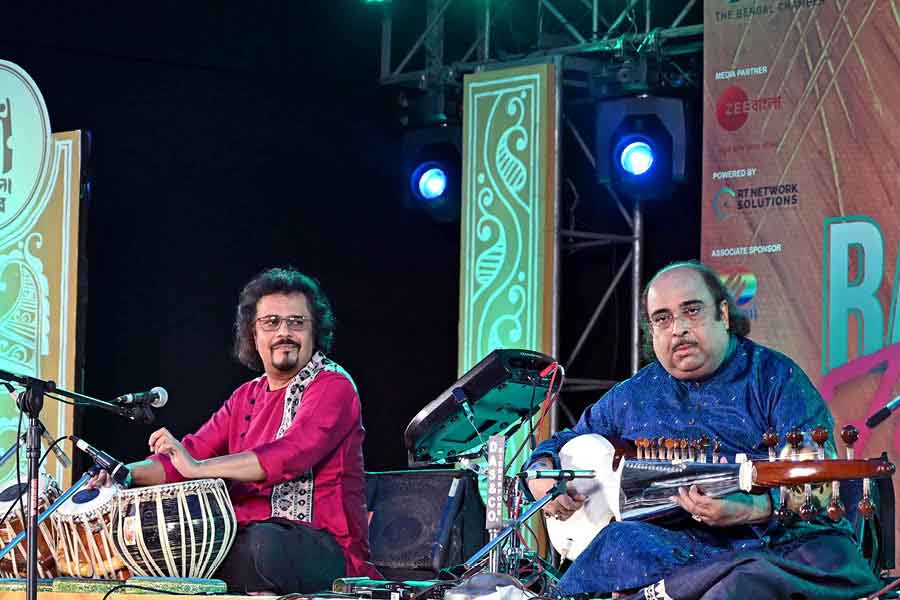
‘Little nuances perform an important role in the whole presentation,’ says Bickram Ghosh Amit Datta
What are your plans regarding the upcoming concert?
BG: On August 18, we two will play for the audience for three hours without any orchestra or any other accompaniment. Just the two of us, playing soulful music. How many concerts like this do you get to attend nowadays? The psychology behind this concert is to slow down, be elevated and go back with a unique experience. We also plan to showcase taals that are going into oblivion or prakars (different types) of the same taal. Since we would have the time, we would like to showcase all these to the audience.
In this age of shorts and reels, do you think the audience will have the patience to sit and listen for three hours?
BG: Shorts are trailers. People now have a very short attention span, which is why they get attracted to shorts. But shorts are like a flash, they cannot be the whole, especially in any performing art. The very basis of Indian classical music is theherao. It connects with you slowly but the effect it produces is long-lasting. It is like deep breathing. Because we lack patience, we want everything to be fast forward. There is a high level of stress and anxiety in society now. The Indian ragas coupled with the taals are de-stressors. They unfold in front of you a world that relaxes your mind and soul. To get a full experience of a complete performance, time is required. One should have that mindset. For a long-lasting and enriching experience, patience is the keyword.
TNM: People do listen to music for hours after a long day of work. Nothing is more relaxing than music. Any kind of classic art cannot be hurried along.
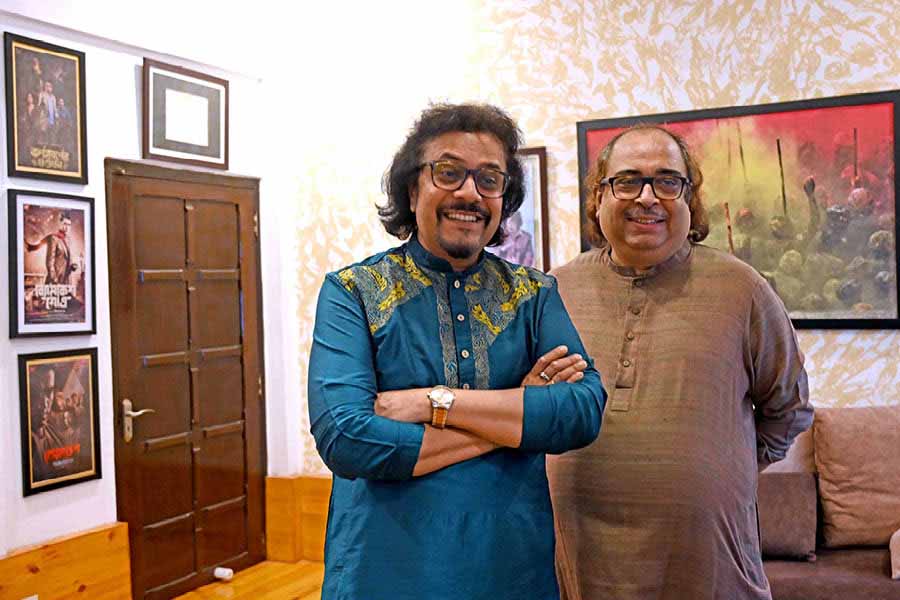
Bickram Ghosh and Tejendra Narayan Majumdar’s friendship goes back to their youth when they would do ‘riyaaz’ together, often joined by the tabla maestro’s father, Shankar Ghosh Amit Datta
BG: In a performance, sometimes, it is difficult to match our speed, because we have practised for hours. But speed is not our greatest achievement. Music should be an experience. The audience must feel it. Music creates emotions. It is an enriching experience that stays with you. There is no shortcut to music or, for that matter, any classic art. We do go in for small concerts but we also want to play long concerts. We want to play a three-hour concert. There is a tremendous amount of curiosity and buzz among people for Indian classical music. People like to hear these kinds of long musical concerts. When we play for an hour, people often come up to us and say that we want to hear more.
So time is essential for the audience to get connected to music. Do you think that the audience should also be educated in music?
TNM: People somehow have a fear of Indian classical music. They think that it’s too complicated to understand. To feel music, you need not understand it. You should get into the habit of listening to music. I know some corporate leaders who, after a long stressful day, de-stress by listening to classical music. And by doing so, they have learnt about ragas and taals. That is the power and strength of our music. The melody of a raga takes time to unfold. Each raga is based on five, seven or nine notes. That is just the framework. The ragas have been played for thousands of years by thousands of artistes on different mediums. But they are so uniquely designed that every time you hear them, there’s something more. The music is not written. It was learnt from the gurus and then improvised. So they become unique, thereby creating a new style. For all this to come through, time is required. It cannot be done in shorts.
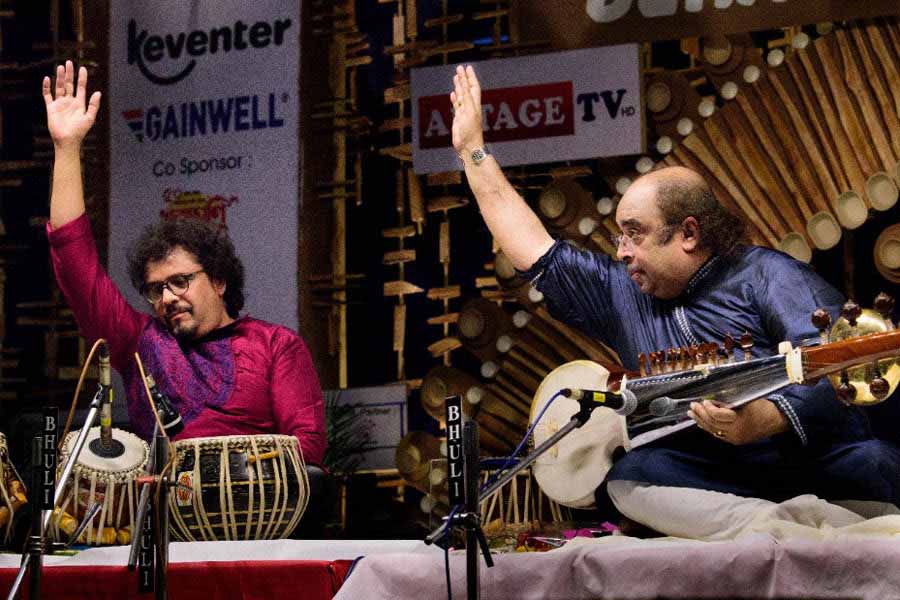
‘Any kind of classical art cannot be hurried,’ says Tejendra Narayan Majumdar Amit Datta
BG: In 1990, I played with Ali Akbar Khan saheb for the first time. He played with me for two hours and then played with my father for three hours. It was a full-house performance. You will see that if a song is based on a raga, it is based on theherao, it touches the soul. I still remember an experience with Sonu Nigam. We were working together on something. One evening, Sonu was looking a little down. He had recorded a song for the movie Agneepath (Abhi Mujh Mein Kahin), but the song was not going to be promoted. But today when we look back, I think that song – and not the peppy number – still lives in the hearts of many. What I mean to say is that any ragasrayi song (songs framed on different ragas) has a lasting effect on the audience. This is the magic of Indian ragas. The minute you hear those songs, it does something to your soul. Ragas have a tremendous emotional impact. For that emotional connection, you need not be educated in music.
Which age group is more attracted towards Indian classical music now?
TNM: We get to see that a good section of the audience is under the age of 40. The problem is not here. The problem is that we live in the age of reels, where everything is fast. But when you come to learn Indian classical music, you should understand that there is no shortcut. You should have the patience.
BG: The sad part is that due to social media, music has also become driven by algorithms. If you can crack the algorithm, you can become famous. But during our times, the senior artistes used to endorse us. They first used to listen to our music and then endorse. “Yeh bahut achcha hai. Iske upar uparwala ka ashirwad hai.” (This person plays well. He is blessed.) But you have to remember that if you want to sustain your quality, you have to give time to music. Proper riyaaz is a must. Only then will the quality stand out.
